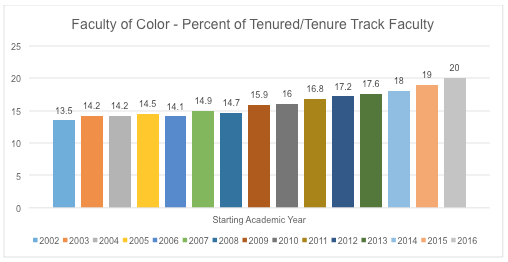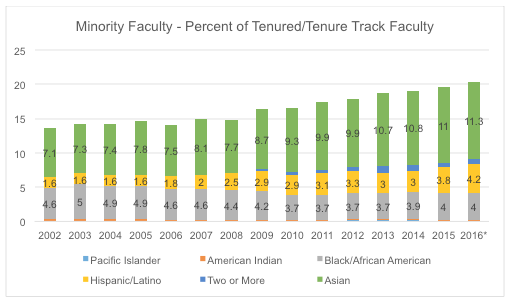NC State Shows Steady Increases in Recruiting Diverse Faculty

A recent article in the Washington Post was titled “An Ivy League Professor on Why Colleges Don’t Hire More Faculty of Color: ‘We Don’t Want Them’.” At NC State, the Recruiting Diverse Faculty program works to ensure that this claim does not apply here, promoting faculty discussion about the interplay and dependence between diversity and excellence.
The percentage of tenured and tenure track faculty of color is small at NC State but has been steadily increasing over the past 10 years, from 14% in 2006 to 20% in 2016. The Recruiting Diverse Faculty (RDF) Program is designed for colleges, departments and individual faculty at NC State that want to accelerate this trend.

Figure reproduced from NC State’s Strategic Planning website.
Note: Data includes African-American, Asian, Hispanic, Native American, Hawaiian/Pacific Islander
faculty members and those reporting two or more ethnic groups.
The same figure is reproduced below with more detail to show how the percentages of specific groups have changed over time.

The percentage of Hispanic/Latinx faculty has more than doubled since 2006 and the percentage of Asian faculty has increased by 50%, but the percentages of Black and American Indian faculty have decreased.
“I believe that there is a desire across the departments at NC State to diversify our faculty in a meaningful and impactful way, but unfortunately many departments don’t know how to do it. My hope is that the RDF program can help all departments reach their own goals related to diversification.”
The RDF program provides a forum for search committees to discuss how faculty diversity fits into their vision for their department, provides tools, templates and techniques for reaching a broad, diverse pool of potential applicants and for evaluating candidates and introduces faculty to current research on group decision-making and how unconscious bias can affect the faculty recruiting process. Unconscious bias affects everyone, and not just people, but computer algorithms also – see for example another Washington Post story from July of 2015 titled “Google’s Algorithm Shows Prestigious Job Ads to Men, but Not to Women.” Once we are aware, we can change the way we think and operate when we are recruiting faculty.
Faculty can incorporate these ideas in many different ways. One powerful way to let students and prospective members of your department or group know that you put a high value on inclusion is to develop a statement for your website.
“My lab welcomes students, postdocs and visiting scholars regardless of race, religion, gender identification, sexual orientation, age or disability status. The more reflective of society’s diversity the lab is, the better we are. It is through diverse perspectives and abilities that we see all possible answers to a problem. It is through such diversity that we create an environment like that which we hope for in society more generally. If our lab does not reflect the diversity of society, we have failed, and that failure is far greater than the failure to discover a species, get a grant or write a paper.”
This fall, 22 search committees have participated in the RDF program, including all search committees in the College of Humanities and Social Sciences and most in the College of Agriculture and Life Sciences. About 30 department heads and deans, including all of the heads in the College of Agriculture and Life Sciences, participated in the RDF summer workshop for department heads. The summer workshop covers important factors to consider before a search begins, such as language for the position description and ensuring that the search committee includes at least one advocate for diversity. For details about the RDF program and tools to aid in your faculty search, see the Faculty Search Toolbox.
The RDF program is modeled on a similar program developed by the NSF-funded ADVANCE Developing Diverse Departments project and implemented for searches in the Chancellor’s Faculty Excellence Program (CFEP) by Laura Severin, professor of English; Dan Solomon, dean emeritus of the College of Sciences; and Wendy Krause, associate professor of textile engineering, chemistry and science. Discussions about diversity and unconscious bias were built into the search process for all of the CFEP interdisciplinary clusters. The CFEP searches resulted in hiring more diverse faculty than standard disciplinary searches.
A team of 12 faculty and administrators advise the RDF program and serve as advocates or facilitators: Winser Alexander, Electrical and Computer Engineering; Lorena Bociu, Mathematics; Tom Gower, Forestry and Environmental Resources; Christine Grant, Chemical and Biomolecular Engineering; Alexandria Graves, Soil Science; Wendy Krause, Textile Engineering, Chemistry and Science; Justin Schwartz, Materials Science and Engineering; Eileen Taylor, Accounting; Wes Watson, Entomology and Plant Pathology, Katharine Stewart, Faculty Affairs; Mary Wyer, Psychology; and Robinette Kelley, Office for Institutional Equity and Diversity. The RDF program is led by Marcia Gumpertz, Office for Institutional Equity and Diversity.
Colleges, departments, search committees and individuals are invited and encouraged to join the RDF program in building a vibrant, diverse faculty for the future of NC State. To participate in the Recruiting Diverse Faculty program, contact Marcia Gumpertz at gumpertz@ncsu.edu.
Dr. Marcia Gumpertz is assistant vice provost for faculty diversity.
- Categories:


